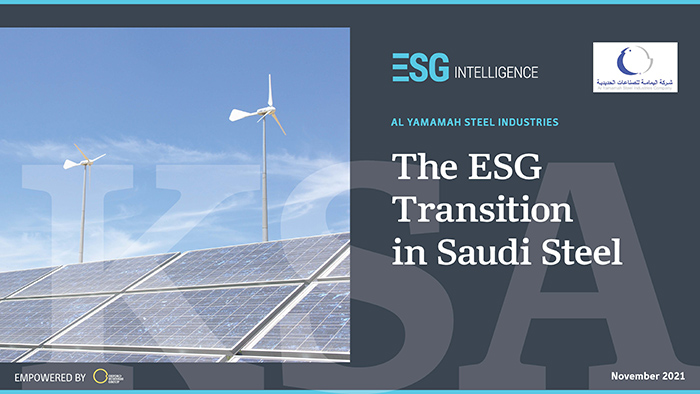The opportunities for businesses to follow the example of Al Yamamah Steel Industries Company (ALYAMAMAH STEEL) and support Saudi Arabia’s transition towards renewable energy are mapped out in a new environmental, social and governance (ESG) produced by Oxford Business Group (OBG).
Titled “The ESG Transition in Saudi Steel”, and produced in partnership with ALYAMAMAH STEEL, the report explores the Kingdom’s progress towards sustainable growth and diversification, in an easy-to-navigate and accessible format, supported by key data and infographics.
The country’s commitment to achieving net zero carbon emissions by 2060, at a time when COP26 has highlighted the urgent need for a more sustainable economic model, is a key focus.
The ESG Intelligence report also examines how closely the targets laid out in Vision 2030, Saudi Arabia’s economic and social reform roadmap, align with the UN’s Sustainable Development Goals.
In its coverage, OBG looks at the move by the Saudi Stock Exchange (Tadawul) to adopt ESG principles against a backdrop of rising investor interest in companies giving weight to environment, social and governance initiatives in their policies.
The report also charts ALYAMAMAH STEEL’s growth story over the years, from its launch in 1989 in the Saudi steel industry to the company’s diversification into six main lines of business today, including the production of steel components for wind and solar energy systems.
The firm’s commitment to ensuring ESG principles are integrated into its long-term vision is also explored, with a focus on programmes to attract, train and retain local talent to support the wider Saudization agenda, as well as efforts to foster a culture of good governance and prudent risk management.
The report includes an in-depth interview with Yousef Bazaid, CEO, Al Yamamah Steel Industries Company, in which he shares his views on a broad range of topical issues, including Saudi Arabia’s progress along the path to a more sustainable economic future.
“The private sector is best placed to enhance efficiencies in the economy and create high-value employment opportunities for Saudi citizens, supported by a fertile knowledge ecosystem and training programmes that align with needs,” he said. “A broad-based economy with a dynamic private sector is more sustainable than an economy dependent primarily on government funding and revenue from hydrocarbons production.”
Jana Treeck, OBG’s Managing Director for the Middle East, said ALYAMAMAH STEEL’s decision to branch out into the production of steel components for renewable energy systems highlighted the positive role heavy industry can play in contributing to Saudi Arabia’s long-term economic diversification strategies and steering the country towards its net zero carbon emissions goal.
“In the near-to-midterm, the government’s plan to increase renewable energy capacity to 50% of the domestic energy mix by 2030 will create a raft of opportunities for businesses during the transition phase and beyond,” Treeck said. “We expect these developments to boost the role of the private sector in Saudi Arabia’s economic advancement and also provide promising employment opportunities for the sizeable population of younger Saudi citizens who are keen to help steer the Kingdom’s future.”
The ESG intelligence reports forms part of a series of tailored studies that OBG is currently producing with its partners, alongside other highly relevant, go-to research tools, including a range of country-specific Growth and Recovery Outlook articles and interviews.


COMMENTS